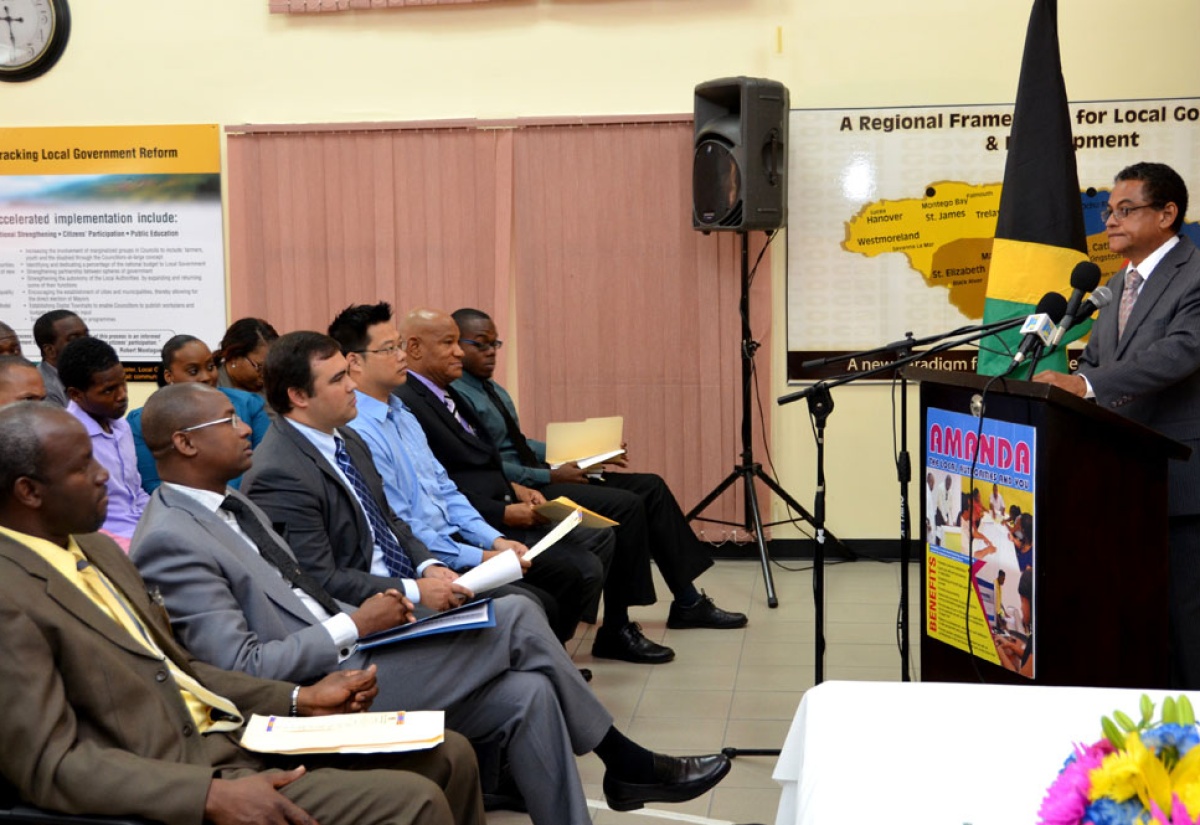Local Government Ministry to Improve Development Approval Process
July 29, 2013The Full Story
The Ministry of Local Government and Community Development is deepening its efforts to improve the development approval process, through the implementation of the Application Management and Data Analysis (AMANDA) software.
As a result, professionals in the land development and construction field will now see their development applications being dealt with in a more efficient manner.
The AMANDA software allows for transparency through the facilitation of a paper trail, reduce inconsistencies and bring to a halt the bottleneck in task assignment and processes within the development sector.
Portfolio Minister, Hon. Noel Arscott, says presently Jamaica “has been able to find a way to make it difficult to get developmental approvals.”
“We have billions of dollars locked up. Persons have come to me personally complaining of how difficult it is to do business in Jamaica and to get their development approval going. Jamaica has found a way to effectively lock up the potential of the country,” Mr. Arscott says.
He was speaking at a press briefing recently, held at the Ministry’s Hagley Park Road offices, in Kingston.
The Minister explains that the AMANDA software will lead to greater compliance by developers and professionals in the land development and construction sector.
“The implementation of the AMANDA software is a major stepping stone in helping to improve Jamaica’s development application process,” Mr. Arscott states.
Among the objectives of the AMANDA is the establishment of a development help desk throughout the local authorities.
The purpose of a help desk is to troubleshoot problems or provide guidance about products and services while supporting customers through various channels.
“One element of the overall programme for using AMANDA software is to review the proposed application for completeness. AMANDA will reject incomplete application and that’s important, because in the past, applications were accepted at the various local authorities, but because the application forms were incomplete the process was stopped. So, after several months the forms are returned because they are incomplete. Once the application is not properly filled out, then the city will reject it,” Mr. Arscott explains.
Once the application has been accepted by the planning agency, the details, such as scanned drawings and relevant information, will be entered into the AMANDA database.
From this database an acceptance letter with a unique reference number will be generated and issued to the applicant.
“The development application process is already integrated into the Amanda software, sending out each task in the process to all the persons responsible for responding to those tasks and the timeline. Once a task has been completed and is indicated in the database, AMANDA prompts the person responsible for performing the next task in the process flow,” the Local Government Minister states.
“We are anticipating that the AMANDA software will, among other things, yield an increase in customer satisfaction, enhance accountability and provide ease of use in the tracking of application by the applicant,” he adds.
Of note is that the government has adopted a strict timeline of 90 days within which a response is granted to all applicants.
So far, the eight local government authorities have been equipped with the AMANADA software. Also, the National Environment and Planning Agency (NEPA) has been using this software since 2002.
The Local Authorities that have already been using the AMANDA software are: Kingston and St. Andrew Corporation (KSAC), and the St. Catherine, Manchester, St. Elizabeth, Hanover, St. James, Trelawny and Clarendon Parish Councils.
“We are hoping, certainly by year end, to add Portmore to that list. Once that is done we’re going to test the efficiency and application. We’re going to move speedily to ensure that all local authorities in the country have this system,” Mr. Arscott informs.
He adds that the Ministry of Local Government is committed to unleashing the economic development potential at the local level.
To fast track the implementation process of the AMANDA software, 30 end users from the three counties are being trained in software management.
The end users being trained are from NEPA, Local Authorities and referral agencies. An additional 10 persons will be trained in information technology for technical support.
“We expect that from the end project of this programme will emerge a cadre of trained technical officers who will be assigned to the parish councils and other developmental agencies. This will result in capacity building and institutional strengthening for the full implementation of the AMANDA system by 2015,” Minister of State in the Ministry of Water, Land, Environment and Climate Change, Ian Hayles, tells JIS News.
So far, training for the first batch of end users took place in Kingston from July 8 to12 and the second batch was trained in Manchester from July 15-19. Other training will take place from August 12 to 16 in Kingston and from August 19 to 23 in St. James.
Implementation of the AMANDA software forms part of the government’s efforts to achieve an effective local government system.


